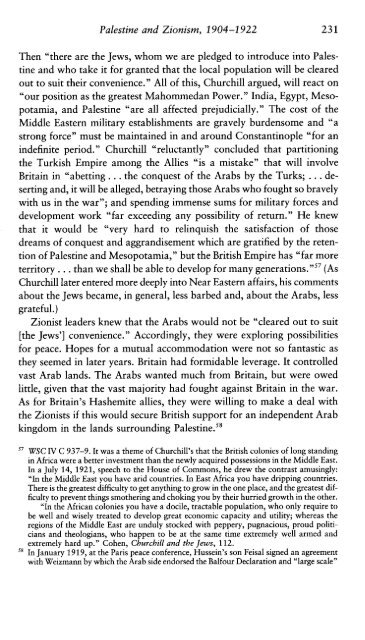Churchill, Palestine and Zionism, 1904-1922 - Douglas J. Feith
Churchill, Palestine and Zionism, 1904-1922 - Douglas J. Feith
Churchill, Palestine and Zionism, 1904-1922 - Douglas J. Feith
You also want an ePaper? Increase the reach of your titles
YUMPU automatically turns print PDFs into web optimized ePapers that Google loves.
<strong>Palestine</strong> <strong>and</strong> <strong>Zionism</strong>, <strong>1904</strong>-<strong>1922</strong> 231<br />
Then "there are the Jews, whom we are pledged to introduce into <strong>Palestine</strong><br />
<strong>and</strong> who take it for granted that the local population will be cleared<br />
out to suit their convenience." All of this, <strong>Churchill</strong> argued, will react on<br />
"our position as the greatest Mahommedan Power." India, Egypt, Mesopotamia,<br />
<strong>and</strong> <strong>Palestine</strong> "are all affected prejudicially." The cost of the<br />
Middle Eastern military establishments are gravely burdensome <strong>and</strong> "a<br />
strong force" must be maintained in <strong>and</strong> around Constantinople "for an<br />
indefinite period." <strong>Churchill</strong> "reluctantly" concluded that partitioning<br />
the Turkish Empire among the Allies "is a mistake" that will involve<br />
Britain in "abetting ... the conquest of the Arabs by the Turks; ... deserting<br />
<strong>and</strong>, it will be alleged, betraying those Arabs who fought so bravely<br />
with us in the war"; <strong>and</strong> spending immense sums for military forces <strong>and</strong><br />
development work "far exceeding any possibility of return." He knew<br />
that it would be "very hard to relinquish the satisfaction of those<br />
dreams of conquest <strong>and</strong> aggr<strong>and</strong>isement which are gratified by the retention<br />
of <strong>Palestine</strong> <strong>and</strong> Mesopotamia," but the British Empire has "far more<br />
territory ... than we shall be able to develop for many generations. ,,57 (As<br />
<strong>Churchill</strong> later entered more deeply into Near Eastern affairs, his comments<br />
about the Jews became, in general, less barbed <strong>and</strong>, about the Arabs, less<br />
grateful.)<br />
Zionist leaders knew that the Arabs would not be "cleared out to suit<br />
[the Jews'] convenience." Accordingly, they were exploring possibilities<br />
for peace. Hopes for a mutual accommodation were not so fantastic as<br />
they seemed in later years. Britain had formidable leverage. It controlled<br />
vast Arab l<strong>and</strong>s. The Arabs wanted much from Britain, but were owed<br />
little, given that the vast majority had fought against Britain in the war.<br />
As for Britain's Hashemite allies, they were willing to make a deal with<br />
the Zionists if this would secure British support for an independent Arab<br />
kingdom in the l<strong>and</strong>s surrounding <strong>Palestine</strong>. 58<br />
57 WSC IV C 937-9. It was a theme of <strong>Churchill</strong>'s that the British colonies of long st<strong>and</strong>ing<br />
in Africa were a better investment than the newly acquired possessions in the Middle East.<br />
In a July 14, 1921, speech to the House of Commons, he drew the contrast amusingly:<br />
"In the Middle East you have arid countries. In East Africa you have dripping countries.<br />
There is the greatest difficulty to get anything to grow in the one place, <strong>and</strong> the greatest difficulty<br />
to prevent things smothering <strong>and</strong> choking you by their hurried growth in the other.<br />
"In the African colonies you have a docile, tractable population, who only require to<br />
be well <strong>and</strong> wisely treated to develop great economic capacity <strong>and</strong> utility; whereas the<br />
regions of the Middle East are unduly stocked with peppery, pugnacious, proud politicians<br />
<strong>and</strong> theologians, who happen to be at the same time extremely well armed <strong>and</strong><br />
extremely hard up." Cohen, <strong>Churchill</strong> <strong>and</strong> the Jews, 112.<br />
58 In January 1919, at the Paris peace conference, Hussein's son Feisal signed an agreement<br />
with Weizmann by which the Arab side endorsed the Balfour Declaration <strong>and</strong> "large scale"


